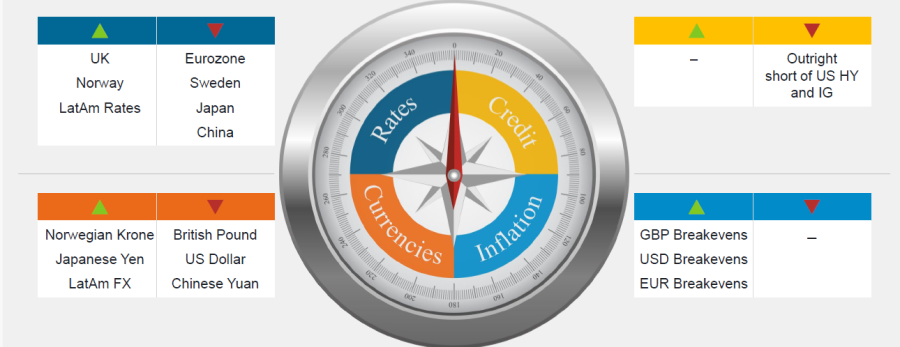It has been a challenging year for the gilt markets, with long-dated government bond yields surging to record highs, but Mike Riddell, manager of the Fidelity Strategic Bond fund, has remained undeterred.
UK assets now represent 15.2% of the Fidelity Strategic Bond fund, a 10.6% overweight compared to the Bloomberg Global Aggregate index. Riddell holds 13% in government bonds, split between a 9.1% holding in UK treasury bills and 3.9% in gilts.
He argued that the UK is one of the “few opportunities” in developed markets for bond investors, with “most currently seeming unattractive”. While there are a handful of exceptions, including Norway, France and Germany, where the manager has a larger exposure than that of the index, the UK is one of the most interesting for him.

Source: Fidelity International.
Investors might be tempted to make comparisons between today and the disastrous 2022 mini-Budget, when the 30-year gilt yield rose to 4.99%, but the current situation is much different, he argued.
“I never really agreed with all these headlines about Rachel Reeves blowing up the gilt market in the first place, because it is not a UK story.”
While the 30-year gilt yield has climbed to the highest level since 1997, this has not been a UK-exclusive trend, with yields surging across the globe, he argued.
Japanese government bonds have risen 160 basis points this year, larger than anything Liz Truss managed during the mini-Budget, he noted. Meanwhile, both Germany and France have experienced “much bigger moves in terms of long-dated bonds this year than the UK as well”.
Instead of worrying about rising yields, investors should consider the strength of the currency to decide if gilts are a worthwhile investment, he explained.
“If the UK is really entering into a crisis scenario, sterling would be through the floor, but on a trade-weighted basis, it's been a fairly good year for it.”
Part of this is due to the underperformance of the dollar, but if there "was even a whiff of a crisis, sterling would be crashing”. Instead, it’s risen back to around the levels of 2015, which is “clearly not indicative of a major downturn”.
Gilts also look favourable when compared to other developed market counterparts, the Fidelity manager noted.
“Sustained fiscal deficits [in developed markets] are killing long-dated bonds, and there are already quite a few rate cuts priced into places like the US, leaving little upside,” he said.
While the UK also runs a twin deficit (a government budget deficit and a current account deficit), it is not to the same “unsustainable levels” as in places such as the US, the manager explained.
“The US believes that because it's the reserve currency, it can do what it wants and people will fund it. Because the UK has the experience of 2022, it knows it can’t loosen the fiscal purse strings too early, which is a big difference,” Riddell said.
UK government bonds are also much cheaper than US treasuries, which is another point in their favour, he explained. This lower starting point is part of why the long end of the yield curve has performed well this year, even despite the impact of tariffs, he said.
“The thing about bond investing is that it’s about picking the ‘least smelly’ thing among these countries.”
Riddell’s optimism for UK government bonds is also based on his positive outlook for the asset class.
Current high levels of inflation are the result of “one-off pressures” rather than enduring issues, so he expects inflation to “drop sharply” in the second half of next year.
This will allow the Bank of England to cut rates much more often in 2026, making the current yield on government bonds more attractive. The market is underestimating this and pricing in just two rate cuts when “many more” could be possible, the Fidelity manager said.
Additionally, while the long end of the gilt markets has been under pressure this year, investors can expect this to alleviate in the next few months.
Over the next six months, Riddell expects maturities to move much shorter, which means there will be significantly lower government bond supply, in turn helping the long end of the curve.
While some commentators have begun to express concerns about the upcoming Budget, which could cause more pressure on the gilt market if the government needs to borrow more, Riddell remained firm.
“Whenever people ask me about the Budget, I say the same thing – I think it’s boring.”
While he noted that a surprise rise in spending on the upside could be a concern during the Budget, “there’s no way the government doesn’t know this after 2022”.
Anything substantial in budgets tends to get signposted well in advance and investors have largely already priced in whatever could happen, meaning it should be a “relative non-event” for gilt prices, he concluded.





